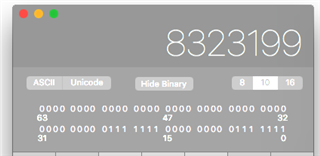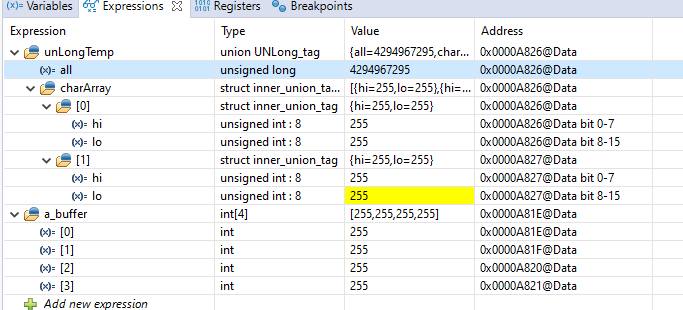- Ask a related questionWhat is a related question?A related question is a question created from another question. When the related question is created, it will be automatically linked to the original question.
This thread has been locked.
If you have a related question, please click the "Ask a related question" button in the top right corner. The newly created question will be automatically linked to this question.
Hi,
after researching T.I. forum I understand uint8_t or char is 16 bits not 8 bits, therefore below union does not work as expected.
typedef union {
uint32_t longValue;
uint8_t charValue[4];
} unLong;
unLong unLongTemp ;
if ...
unLongTemp.charValue[0] = 135
unLongTemp.charValue[0] = 214
unLongTemp.charValue[0] = 18
unLongTemp.charValue[0] = 0
the unLongTemp.longvalue = 14024839 not expected 1234567 because each charValue is 16 bit wide
now I use below codes instead...
uint8_t i;
uint32_t longValue[4];
for (i=0; i<=charGetIndex; i++)
{
longValue[i] = charBuffer[charGetIndex];
longValue[i] = charBuffer[charGetIndex + i];
longValue[i] = charBuffer[charGetIndex + i];
longValue[i] = charBuffer[charGetIndex + i];
}
return ((longValue[0]<<24&0xFF000000) | (longValue[1]<<16&0x00FF0000) | (longValue[2]<<8&0x0000FF00) | (longValue[3]&0x000000FF))&0xFFFFFFFF;
My question is, how can I use UNION with char / uint8_t is actually 16 bits wide ?
Thanks,
Danny
Hi Danny,
If you have installed C2000Ware SDK, please take a look at this header file.
C:/ti/c2000/C2000Ware_4_02_00_00/device_support/f28002x/headers/include/f28002x_sysctrl.h
This file defines the unions and structures for system control.
Hope it helps.
Regards, Santosh
Hi Santosh,
thanks for your information, its worked, can you help if I want to use array inside structure ?
below codes OK
struct CHAR_IN_LONG {
uint16_t charValue1:8;
uint16_t charValue2:8;
uint16_t charValue3:8;
uint16_t charValue4:8;
};
typedef union UNLONG {
uint32_t all;
struct CHAR_IN_LONG bit;
} UNLong;
UNLong unLongTemp;
unLongTemp.bit.charValue1 = a_buffer[0]&0xFF;
unLongTemp.bit.charValue2 = a_buffer[1]&0xFF;
unLongTemp.bit.charValue3 = a_buffer[2]&0xFF;
unLongTemp.bit.charValue4 = a_buffer[3]&0xFF;
--------------------------------------------------------------------------------------------------------------
--------------------------------------------------------------------------------------------------------------
below codes NOT OK
struct CHAR_IN_LONG {
uint16_t charValue[4]:8;
};
typedef union UNLONG {
uint32_t all;
struct CHAR_IN_LONG bit;
} UNLong;
UNLong unLongTemp;
unLongTemp.bit.charValue[0] = a_buffer[0]&0xFF;
unLongTemp.bit.charValue[1] = a_buffer[1]&0xFF;
unLongTemp.bit.charValue[2] = a_buffer[2]&0xFF;
unLongTemp.bit.charValue[3] = a_buffer[3]&0xFF;
regards,
Danny
What is the symptom in No-Good condition?
when declare array inside struct with bit field, I have got error
error #xxx: invalid type for a bit field
struct CHAR_IN_LONG {
uint16_t charValue[4]:8; // this got error ....
};
typedef union UNLONG {
uint32_t all;
struct CHAR_IN_LONG bit;
} UNLong;
UNLong unLongTemp;
unLongTemp.bit.charValue[0] = a_buffer[0]&0xFF;
unLongTemp.bit.charValue[1] = a_buffer[1]&0xFF;
unLongTemp.bit.charValue[2] = a_buffer[2]&0xFF;
unLongTemp.bit.charValue[3] = a_buffer[3]&0xFF;
Danny,
Requesting compiler expert to take a look at this. We should hear sometime later day/tomorrow.
Regards, Santosh
I think this example is very close to what you need to write.
#include <stdint.h>
typedef union UNLong_tag {
uint32_t all;
struct inner_union_tag {
uint16_t val : 8;
} charArray[4];
} UNLong;
int a_buffer[4];
UNLong unLongTemp;
void fxn()
{
unLongTemp.charArray[0].val = a_buffer[0]&0xFF;
unLongTemp.charArray[1].val = a_buffer[1]&0xFF;
unLongTemp.charArray[2].val = a_buffer[2]&0xFF;
unLongTemp.charArray[3].val = a_buffer[3]&0xFF;
}Thanks and regards,
-George
Hi George,
if assign 0x0111 111 (127 decimal) to each val array member, the uint32 all is :
8323199 not excepted 2139062143
typedef union UNLong_tag {
uint32_t all;
struct inner_union_tag {
uint16_t val : 8;
} charArray[4];
} UNLong;
int a_buffer[4];
UNLong unLongTemp;
void fxn()
{
a_buffer[0] = 127;
a_buffer[1] = 127;
a_buffer[2] = 127;
a_buffer[3] = 127;
unLongTemp.charArray[0].val = a_buffer[0]&0xFF;
unLongTemp.charArray[1].val = a_buffer[1]&0xFF;
unLongTemp.charArray[2].val = a_buffer[2]&0xFF;
unLongTemp.charArray[3].val = a_buffer[3]&0xFF;
}


if assign 0xFF (255 decimal) to charArray, the uint32 all is :
16711935 not expected 4294967295
void fxn()
{
a_buffer[0] = 255;
a_buffer[1] = 255;
a_buffer[2] = 255;
a_buffer[3] = 255;
unLongTemp.charArray[0].val = a_buffer[0]&0xFF;
unLongTemp.charArray[1].val = a_buffer[1]&0xFF;
unLongTemp.charArray[2].val = a_buffer[2]&0xFF;
unLongTemp.charArray[3].val = a_buffer[3]&0xFF;
}


Thanks
Danny
My previous post is in error. I apologize.
can you help if I want to use array inside structure ?
It is not possible to have an array of anything that is smaller than 16-bits. Thus, the best you can do is something similar to ...
#include <stdint.h>
typedef union UNLong_tag {
uint32_t all;
struct inner_union_tag {
uint16_t hi : 8;
uint16_t lo : 8;
} charArray[2];
} UNLong;
int a_buffer[4];
UNLong unLongTemp;
void fxn()
{
unLongTemp.charArray[0].hi = a_buffer[0]&0xFF;
unLongTemp.charArray[0].lo = a_buffer[1]&0xFF;
unLongTemp.charArray[1].hi = a_buffer[2]&0xFF;
unLongTemp.charArray[1].lo = a_buffer[3]&0xFF;
}I suspect you want to avoid names for the 8-bit wide fields, such as hi and lo in this example. Unfortunately, that is not possible.
Thanks and regards,
-George
Hi George,
I suspect you want to avoid names for the 8-bit wide fields, such as hi and lo in this example. Unfortunately, that is not possible.
I am OK with it.
Now I have a question, if I assign 0xFF to each hi and lo, i got signed value.
e.g. if hi lo assigned with 0x7F, the unLongTemp.all is 2139062143 011111111 011111111 011111111 011111111
a_buffer[0] = 0x7F;
a_buffer[1] = 0x7F;
a_buffer[2] = 0x7F;
a_buffer[3] = 0x7F;
however if hi lo assigned with 0xFF, the unLongTemp.all is -1
a_buffer[0] = 0xFF;
a_buffer[1] = 0xFF;
a_buffer[2] = 0xFF;
a_buffer[3] = 0xFF;

Danny
When I use George's example code and set a_buffer all to 0xFF, this is what I see in the expressions view:

The Expressions view in your screenshot is not showing the type, which is odd to me.
I only tried on my Windows PC. I'll try on my Mac when I have a chance.
What OS X version are you using?
Thanks
ki